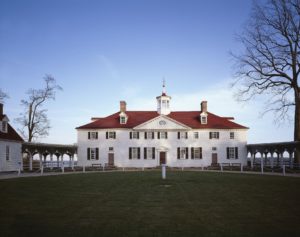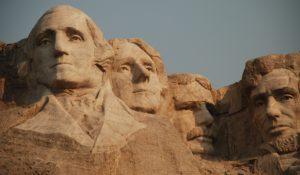The Enduring Fascination of George Washington
Written by William M. Ferraro, Research Associate Professor and Senior Associate Editor, The Washington Papers, College and Graduate School of Arts & Sciences
George Washington still attracts attention. Some one million people visit his Mount Vernon home every year. Both scholarly and popular investigations of his life and role in historical events pour forth in a continuous stream. His complex relationship with a protégé helped inspire the creator of the smash Broadway musical Hamilton, which persists as a sensation that has invigorated interest in history, particularly the founding era of the United States and the contradictions between ideals and realities that have shaped—and troubled—the nation’s evolution.
First-year students at the University of Virginia have demonstrated their curiosity regarding George Washington during the past two fall semesters by enthusiastically signing up for my course, “Understanding the Early Nineteenth Century through George Washington as Historical Figure and Symbol.” Offered as a COLA 1500 class in the College of Liberal Arts and Sciences, it draws upon my expertise as an 18th and 19th century historian who has edited The Papers of George Washington for more than a decade to introduce students to the fundamentals of historical research and interpretation through a focus on initial efforts to make sense of Washington’s extraordinary life. Class sessions also include regular advice on how to succeed as a college student through time management, healthy lifestyle decisions, and enjoyment of the learning process.
Students discover a great deal about Washington even though the emphasis is on understanding the United States in the period immediately following his death in December 1799. The opening assignment is Henry Lee, Jr.’s immortal eulogy, which served as the official congressional expression of condolence. Remembered most for the phrases “First in war—first in peace—and first in the hearts of his countrymen,” Lee’s celebration of his friend’s achievements and character managed to elevate Washington’s already exalted stature in the public mind. We next turn to Mason Locke “Parson” Weems, who humanized Washington in biographies that moved from classical allusions in the earliest editions to later editions with homely—and likely fictitious—stories (such as young George chopping down his father’s favorite cherry tree) ostensibly gleaned from conversations with childhood friends and acquaintances.

From this lesson in the manipulation of historical memory for both pecuniary gain and moralistic ends, we move to a close reading of Washington’s will, which he wrote on his own in the final year of his life. The will is remarkable for its insights into Washington’s thinking and his vision for the United States. He sees slavery and sectionalism as evils. To counteract their baleful tendencies and start beneficial change, he made provisions to free his own slaves and to institute a national university. The details in this primary document admirably show the students how to derive information from such sources to substantiate arguments. Unfortunately, Washington’s hopes for peaceful and salutary change went unfulfilled.
John Marshall’s five-volume Life of George Washington (Philadelphia, 1804-7), the first authorized biography written with full access to the subject’s voluminous personal papers, structures the closing weeks of the course. Chief Justice Marshall undertook this task at the request of Associate Justice Bushrod Washington, the first president’s favorite nephew. Subscriptions financed the work, and the some 9,000 subscribers can be found listed under states and localities in a map volume sold with the American edition. The course’s writing assignment takes advantage of this fine data set. Students choose a subscriber from their hometown or area (or a place that is meaningful to them if they live in a state not settled in the early 19th century) and prepare a five-page paper that explains why that person would have subscribed to Washington’s biography. Possible motivations are service in the Continental army, political loyalties or aspirations, personal friendship, entrepreneurial interests, respectfulness, or general edification. All contentions must be based on primary and secondary research on the subscriber’s life and place of residence. Thanks to the resources available through the UVA Library—especially the various scholarly and documentary databases—undergraduates can readily perform their work on grounds.

Students from Charlottesville have written about Thomas Jefferson, who actually wrote letters on how he believed Marshall’s book to be little more than Federalist Party advocacy in opposition to his presidential administration. A student from New York wrote on DeWitt Clinton, builder of the Erie Canal, who probably desired Washington’s biography to learn more about another man with ambitions for economic development and national expansion. A student from Richmond wrote on Gervas Storrs, a local officeholder who found himself at the center of the investigation into Gabriel’s Rebellion, a sidetracked slave revolt in 1800 that unnerved nearly all white Virginians. This fine paper brought Storrs to my notice for the first time. A student who hailed from Colorado chose Margaret Atwood, the only female subscriber from Newburyport, Massachusetts, and discovered that she was a distant relative!
George Washington loomed large over the nation in the decades after his death, and he remains a presence in our current world. Yes, he exhibited flaws and failings, but his life of tireless activity and conscientious reflection led to noble accomplishments with profound repercussions for the future. Washington earned enduring fascination.
- A Revolution in the Air: The Wright Brothers Take to the Sky on December 17, 1903
- Musings on National Violin Day
- Making the Promise Real: How a UN Tax Convention Can Fulfill the UNDHR’s Vision
- UVA Club of Atlanta: Virtual Pilates Class
- UVA Club of Vietnam: J-Term Farewell Social
- UVA Club of Atlanta: UVA Women's Basketball at Georgia Tech
